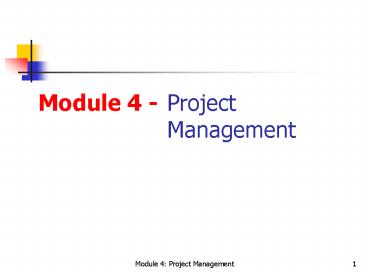Module 4 Project Management - PowerPoint PPT Presentation
1 / 24
Title:
Module 4 Project Management
Description:
A major event like a wedding. Any construction project. Designing a political campaign. Module 4: Project Management. 5. Network Planning Techniques ... – PowerPoint PPT presentation
Number of Views:8
Avg rating:3.0/5.0
Title: Module 4 Project Management
1
Module 4 - Project Management
2
Course Framework
- 1. Cost
- - Design Selection
- 2. Quality
- - TQM
- - SQC
- 3. Speed
- - Project Management
- - Supply Chain
- 4. Flexibility
- - Inventory
- - Location
- - Forecasting
- - Aggregate Planning
3
Learning Objectives
- Understand project management background
- Understand basic project management analysis
- Understand basic crashing analysis
4
1. Project Management
- What is a project?
- Any endeavor with objectives
- With multiple activities
- With defined precedent relationships
- With a specific time period for completion
- Examples?
- A major event like a wedding
- Any construction project
- Designing a political campaign
5
Network Planning Techniques
- Program Evaluation Review Technique (PERT)
- Developed to manage the Polaris missile project
- Critical Path Method (CPM)
- Developed to coordinate maintenance projects in
the chemical industry
6
Both PERT and CPM
- Graphically display the precedence relationships
sequence of activities - Estimate the projects duration
- Identify critical activities that cannot be
delayed without delaying the project - Estimate the amount of slack associated with
non-critical activities
7
Network Diagrams
- Activity-on-Node (AON)
- Uses nodes to represent the activity
- Uses arrows to represent precedence relationships
8
Network Diagrams
- Activity-on-Node (AON)
- Uses nodes to represent the activity
- Uses arrows to represent precedence relationships
9
Network Diagrams
- Activity-on-Node (AON)
- Uses nodes to represent the activity
- Uses arrows to represent precedence relationships
10
Network Diagrams
- Activity-on-Node (AON)
- Uses nodes to represent the activity
- Uses arrows to represent precedence relationships
11
2. Project Analysis
12
Project Network
13
Forward Pass
- Early Start The earliest an activity can start
being worked on - Early Finish Early Start Activity Time
- Result is project completion time.
14
Project Network
12/20
20/32
32/36
0/12
12/16
24/28
20/24
15
Backwards Pass
- Late Finish Latest an activity can be completed
and still have project completed on time - Late Start Late Finish Activity Time
- Needed for finding critical path and slack values.
16
Project Network
20/32 20/32
12/20 12/20
32/36 32/36
0/12 0/12
12/16 16/20
24/28 28/32
20/24 24/28
17
Slack
- Slack Amount of time an activity can be delayed
without delaying completion time of project. - Slack Late Finish Early Finish
- Slack of activities on critical path 0
18
Project Network
Critical Path A, B, D, G Time 36 weeks
12/20 12/20 0
20/32 20/32 0
32/36 32/36 0
0/12 0/12 0
24/28 28/32 4
12/16 16/20 4
20/24 24/28 4
19
3. Project Crashing
- Crashing
- reducing project time by expending additional
resources - Crash time
- amount of time an activity is reduced
- Crash cost
- cost of reducing activity time
- Goal
- reduce project duration at minimum cost
20
Crashing Example
Critical Path A, B, D, G Time 36 weeks Cost
75,000
21
Crashing Example
Critical Path A, B, D, G Time 36 weeks Cost
75,000
22
Crashing Procedures
- Basic idea Shortening/crashing times of
activities on critical path will immediately
shorten completion time. - Shorten activity time of low-cost activity on the
critical path.
23
Basic Approach
Critical Path A, B, D, G Time 36 weeks
Reduce Activity A Lowest cost on CP
A. Cost 75,000
24
Basic Approach
B. Comp. time 35 weeks Cost 75,400
Reduce Activity A Lowest cost on CP































